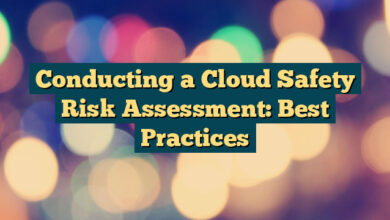The Top Cloud Protection Safety Assessment Tools
Contents
- 1 💻 Secure Your Cloud with These Assessment Tools
- 2 🔎 What Are Cloud Protection Safety Assessment Tools?
- 3 🔒 The Top Cloud Protection Safety Assessment Tools
- 4 💪 Strengths and Weaknesses of The Top Cloud Protection Safety Assessment Tools
- 5 ❓ Frequently Asked Questions
- 5.1 1. What are cloud protection safety assessment tools?
- 5.2 2. Why are cloud protection safety assessment tools important?
- 5.3 3. What are the top cloud protection safety assessment tools?
- 5.4 4. What factors should businesses consider when choosing a cloud protection safety assessment tool?
- 5.5 5. What are the benefits of using cloud protection safety assessment tools?
- 5.6 6. Can businesses use multiple cloud protection safety assessment tools?
- 5.7 7. How often should businesses perform cloud security assessments?
- 6 👋 Conclusion
💻 Secure Your Cloud with These Assessment Tools
Hello Visitors,
In today’s technological world, data protection is crucial for any business or organization. The rise of cloud computing has made it possible to store and access data remotely, but it also poses a significant security risk. Cyber threats are increasing every day, and companies need to be vigilant in securing their cloud. In this article, we will explore the top cloud protection safety assessment tools that can help you keep your data safe from hackers and cyber threats.
🔎 What Are Cloud Protection Safety Assessment Tools?
Cloud protection safety assessment tools are a set of software tools designed to test and evaluate the security posture of cloud environments. These tools help businesses identify vulnerabilities in their cloud infrastructure, which could potentially lead to data breaches and other security incidents. By utilizing these tools, companies can take proactive measures to mitigate risks, improve their security posture, and ensure compliance with regulatory requirements such as GDPR and HIPAA.
🔒 The Top Cloud Protection Safety Assessment Tools
| Tool Name | Description | Strengths | Weaknesses |
|---|---|---|---|
| 1. AWS Inspector | AWS Inspector is an automated security assessment service that helps improve the security and compliance of applications deployed on AWS. | • Automated assessment of AWS resources • Integration with other AWS services • Compliance with industry standards |
• Limited integration with third-party tools • Requires AWS infrastructure |
| 2. Qualys Cloud Platform | The Qualys Cloud Platform is a suite of security and compliance solutions that provide companies with a unified view of their security posture. | • Comprehensive vulnerability scanning • Threat intelligence integration • Compliance with regulatory requirements |
• Complex pricing structure • Limited customization options |
| 3. McAfee Cloud Workload Security | McAfee Cloud Workload Security is an automated security solution that helps businesses protect their cloud workloads from cyber threats. | • Automated workload discovery and protection • Integration with other McAfee solutions • Multi-cloud support |
• Limited customization options • Requires McAfee infrastructure |
| 4. Azure Security Center | Azure Security Center is a unified security management tool that helps businesses protect their cloud workloads across Azure and hybrid environments. | • Integration with other Azure services • Compliance with industry standards • Multi-cloud support |
• Limited customization options • Requires Azure infrastructure |
| 5. Google Cloud Security Command Center | Google Cloud Security Command Center is a security and data risk platform that helps businesses manage their security and compliance risks across Google Cloud services. | • Integration with other Google Cloud services • Automated security recommendations • Compliance with industry standards |
• Limited customization options • Requires Google Cloud infrastructure |
💪 Strengths and Weaknesses of The Top Cloud Protection Safety Assessment Tools
The top cloud protection safety assessment tools have many strengths and weaknesses that businesses and organizations need to consider when choosing a tool that fits their specific needs.
1. AWS Inspector
Strengths:
• Automated assessment of AWS resources: AWS Inspector automatically assesses instances, applications, and services running on AWS infrastructure, reducing the need for manual intervention.
• Integration with other AWS services: AWS Inspector integrates with other AWS services such as CloudWatch and AWS Config, providing businesses with a comprehensive view of their security posture.
• Compliance with industry standards: AWS Inspector helps businesses comply with industry-specific regulations such as HIPAA and PCI DSS.
Weaknesses:
• Limited integration with third-party tools: AWS Inspector is primarily designed for use in AWS environments and offers limited integration with third-party tools.
• Requires AWS infrastructure: AWS Inspector requires businesses to use AWS infrastructure, which may not be a viable option for businesses that use multiple cloud providers.
2. Qualys Cloud Platform
Strengths:
• Comprehensive vulnerability scanning: The Qualys Cloud Platform offers a comprehensive vulnerability scanning tool that identifies and prioritizes risks based on the likelihood of exploitation.
• Threat intelligence integration: The platform integrates with third-party threat intelligence feeds, allowing businesses to get real-time alerts and recommendations for mitigating risks.
• Compliance with regulatory requirements: The Qualys Cloud Platform helps businesses comply with regulatory requirements such as GDPR and HIPAA.
Weaknesses:
• Complex pricing structure: The platform’s pricing structure is complex, which can make it difficult for businesses to estimate the cost of using the platform.
• Limited customization options: The platform offers limited customization options, which may not be suitable for businesses with specific security requirements.
3. McAfee Cloud Workload Security
Strengths:
• Automated workload discovery and protection: McAfee Cloud Workload Security automatically discovers and protects workloads, reducing the need for manual intervention.
• Integration with other McAfee solutions: The platform integrates with other McAfee solutions such as ePolicy Orchestrator and McAfee Virtual Network Security Platform.
• Multi-cloud support: The platform supports multiple cloud providers, making it a viable option for businesses that use hybrid cloud environments.
Weaknesses:
• Limited customization options: The platform offers limited customization options, which may not be suitable for businesses with specific security requirements.
• Requires McAfee infrastructure: Businesses need to use McAfee infrastructure to utilize the platform, which may not be a viable option for companies that use multiple cloud providers.
4. Azure Security Center
Strengths:
• Integration with other Azure services: Azure Security Center integrates with other Azure services such as Azure Advisor and Azure Sentinel, providing businesses with a comprehensive view of their security posture.
• Compliance with industry standards: Azure Security Center helps businesses comply with industry-specific regulations such as GDPR and ISO 27001.
• Multi-cloud support: The platform supports multiple cloud providers, making it a viable option for businesses that use hybrid cloud environments.
Weaknesses:
• Limited customization options: The platform offers limited customization options, which may not be suitable for businesses with specific security requirements.
• Requires Azure infrastructure: Businesses need to use Azure infrastructure to utilize the platform, which may not be a viable option for companies that use multiple cloud providers.
5. Google Cloud Security Command Center
Strengths:
• Integration with other Google Cloud services: Google Cloud Security Command Center integrates with other Google Cloud services such as Cloud Identity and Access Management, providing businesses with a comprehensive view of their security posture.
• Automated security recommendations: The platform provides businesses with automated security recommendations based on real-time threat intelligence feeds.
• Compliance with industry standards: Google Cloud Security Command Center helps businesses comply with industry-specific regulations such as SOC and PCI DSS.
Weaknesses:
• Limited customization options: The platform offers limited customization options, which may not be suitable for businesses with specific security requirements.
• Requires Google Cloud infrastructure: Businesses need to use Google Cloud infrastructure to utilize the platform, which may not be a viable option for companies that use multiple cloud providers.
❓ Frequently Asked Questions
1. What are cloud protection safety assessment tools?
Cloud protection safety assessment tools are a set of software tools designed to test and evaluate the security posture of cloud environments.
2. Why are cloud protection safety assessment tools important?
Cloud protection safety assessment tools help businesses identify vulnerabilities in their cloud infrastructure, which could potentially lead to data breaches and other security incidents.
3. What are the top cloud protection safety assessment tools?
The top cloud protection safety assessment tools are AWS Inspector, Qualys Cloud Platform, McAfee Cloud Workload Security, Azure Security Center, and Google Cloud Security Command Center.
4. What factors should businesses consider when choosing a cloud protection safety assessment tool?
Businesses should consider factors such as the tool’s capabilities, ease of use, compliance with regulatory requirements, integration with other tools, and pricing structure when choosing a cloud protection safety assessment tool.
5. What are the benefits of using cloud protection safety assessment tools?
The benefits of using cloud protection safety assessment tools include identifying security vulnerabilities, mitigating risks, improving compliance with regulatory requirements, and improving the overall security posture of the organization.
6. Can businesses use multiple cloud protection safety assessment tools?
Yes, businesses can use multiple cloud protection safety assessment tools to improve their security posture. However, it is important to consider the potential overlap and redundancy when using multiple tools.
7. How often should businesses perform cloud security assessments?
Businesses should perform cloud security assessments regularly, ideally on a quarterly basis, to identify and mitigate risks in a timely manner.
👋 Conclusion
In conclusion, securing cloud environments is crucial for businesses today. The top cloud protection safety assessment tools such as AWS Inspector, Qualys Cloud Platform, McAfee Cloud Workload Security, Azure Security Center, and Google Cloud Security Command Center can help businesses identify and mitigate security risks. However, businesses need to consider the strengths and weaknesses of each tool and choose one that fits their specific needs. By utilizing these tools, businesses can improve their security posture, meet regulatory requirements, and protect their data from cyber threats.
If you have any questions or concerns about cloud protection safety assessment tools, feel free to reach out to us for more information.
Disclaimer: The information in this article is for educational purposes only and should not be construed as legal or professional advice. We recommend that businesses consult with a qualified professional before implementing any cloud security solutions.







